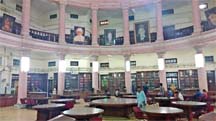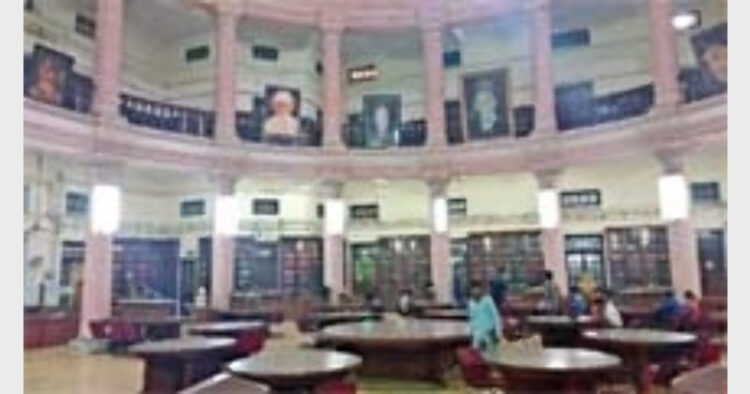 In its 100 years of history the Banaras Hindu University (BHU) has produced immensely talented individuals who have left indelible impressions in their respective fields across the world. And this tradition still continues. According to an estimate globally there are around 10 lakh people educated in the BHU contributing towards various aspects of social life. And then who can forget the contribution of BHU engineers in building new India?
In its 100 years of history the Banaras Hindu University (BHU) has produced immensely talented individuals who have left indelible impressions in their respective fields across the world. And this tradition still continues. According to an estimate globally there are around 10 lakh people educated in the BHU contributing towards various aspects of social life. And then who can forget the contribution of BHU engineers in building new India?
Dr SK Maini, who made the first electric car Reva in India is a pass out from BHU. Further, BHU students are also working in ISRO and NASA and similar such big institutions. Several students are doing exemplary work in field of healthcare as well.
The second Sarsanghchalak of RSS Guruji, VHP Patron Ashok Singhal, scientist Shanti Swaroop Bhatnagar, former Deputy PM Babu Jagjivan Ram, former Vice-President Krishnakant, socialist thinker Ram Manohar Lohia, thinker KN Govindacharya, politician Vedprakash Goyal, Prakshvir Shastri, Nepalese PM BP Koirala, Fiji”s famous leader BD Lakshman, musician Dr Bhupen Hazarika, poet-writer Harivanshrai Bachchan, scientist CNR Rao, artist Kapila Vatsyayan, Justice B S Chauhan, Senior Google executive Nikesh Arora all are alumni from the BHU.
Other than these several foreign students have had their education from BHU, notable among them are American psychologist Collin Turnbull, philosopher Robert M Persing, Belgium Indologist Konrad Elst. Pakistani scholar Ahmed Hasan Dani was the first Muslim to obtain a degree and post graduate degree from BHU. Excerpts of discussions with some of the ex-students of BHU
‘I am what I am because
of BHU’
What I got from BHU: After obtaining my BA, MA and PhD from BHU, I taught there for many years. Had I not taught there, you would not have known me. I was fortunate to get blessings and cooperation of many scholars in Hindi. Whatever I am today is because of BHU .When I went there to study Pandit Keshav Prasad Mishra was the head of Hindi department. Each student was benefited with his scholarship. After him Acharya Hazari Prasad Dwivedi became the head. I received my education from such eminent scholars and I was fortunate enough to receive education from them.
Where would you like to see the BHU:
It is a matter of great pleasure to see BHU contributing in educating students besides enriching and developing them.
“Students are honed due to samskars”
What did you get from BHU: I obtained my PhD in Sanskrit in 1955-57 from the BHU. My education and stay at the University transformed me as a person. Maybe, this is the experience of all the students. I remember an incident about one of my colleagues from South India. When he went home after completing his studies he took with him my book ‘Paninikal me Bharatvarsh’. When I did not get the book back after a passage of long time, I wrote to him and he complied. This I think was possible because of the sanskars he received from BHU. When I got the book back I was more than happy because that was invaluable for me. The book was written by Dr Vasudevsharan Agrawal. He would never gift his books to any one not even the vice-chancellor. Once I went to his house and naturally the discussion started around this book. He asked me whether I read this book. I replied that I had to do with scholarship and it was not possible for me to purchase the book. He immediately took out a copy of that book, signed it and gifted it to me. His writing inspires me even today.
Where would you like to see the BHU:
Today, every university must encourage research. I expect the same from BHU. It is true that BHU is carrying out research in areas which are untouched by other universities. That distinguishes BHU from others.
‘Learnt austerity and simple living’
What did you get from BHU: My father used to say that development of knowledge and science in India should be based on Indian culture. And he considered the BHU as an ideal place for this. Hence he got me admitted to BHU. 66 years ago, BHU taught me to keep life simple and transparent in order to draw maximum happiness. This principle of BHU still inspires me today and I lead an austere life and ask others to follow the same.
Where would you like to see the BHU:
There is no other university like BHU. This university was established on the donations collected from common people by Pandit Malaviya ji. This is his fame institutionalised. I would like that this fame enlightens the entire world.
“I grew with it, studied and progressed”
What you got from BHU: My father Prof. Vishnu Vasudev Narlikar came to BHU from London in 1932 at the request of Mahamana Malaviya ji. He was made head of mathematics department. When I was young, my father brought me to BHU from Kolhapur. I grew here, studied and progressed. This is my biggest achievement. In those days stalwarts like Dr SS Joshi Chemistry scholar, Dr Darshanacharya of Physics, Dr Dhanekar of Ayurveda, Prof Sengupta of Engineering, Hazari Prasad Dwivedi of Hindi used to gather at our house. I feel proud of those days and moments in my life. I consider myself fortunate to have spent some time in the company of these stalwarts. The atmosphere gives a definite direction to the people.
Where would you like to see the BHU:
I feel there is a drought of national-level talent coming out of the BHU. There is a need to change this image. BHU still has that power and capability to earn its due place in global universities and if the BHU administration vows to make it so in its 100th year, nothing can stop them.
‘I can”t repay BHU’
What did you get from BHU: It is my great fortune that I was born in the family of Mahamana Madan Mohan Malaviya ji as his grandson in 1936. My birthplace and education place is BHU. I stayed in BHU campus from 1936 to 1959. I began my studies here and completed them too. I came to Allahabad in 1959 and started working in the court as a lawyer. Later I became a judge. I cannot repay what I got from BHU.
Where would you like to see the BHU:
It is the most satisfactory thing to note that the standard of education in BU has remained the same. The founder”s intention was to give modern education to new generation of Bhartiyas along with the ancient knowledge. He started teaching of Veda and Panchang along with engineering. BHU is the first university of India where engineering was taught for the first time. I hope these traditions continue in future.
“Got initiated in nationalism”
What did you get from BHU: BHU has been a different university since its inception. Each student is initiated in nationalism along with these regular studies. We too were not different. We received the samskar of nationalism here and abilities to stand against injustice. At the time of emergency Shri Kalulal Srimali was the Vice Chancellor and he was a communist. Immediately after accepting the responsibility he started political discrimination. We opposed him and he rusticated 46 students including me. Later he said that the rustication could be revoked if we apologise. But we stood firm on our stand that we had not committed any mistake so there was no question of apologising. Later the action was withdrawn. Had we not studied there we would have been a different individuals.
Where would you like to see the BHU:
It is my wish that this university should progress in translating the original ideas of Malaviya ji. His idea was to include modern subjects along with the study of Hindu dharma–sanskriti. But he had to make changes in accordance to the then prevailing rulers and their system. Now the atmosphere is favourable and we must try to translate his ideas into reality.
“BHU Samskars inspired me to come back to India”
What did you get from BHU: I did my graduation and post graduation in Agricultural Sciences from the BHU. Later I went the Australia for PH D. There I was given a better job proposal with high salary and prestige but I was not inclined to work there. The samskarsa I got at BHU compelled me to come back to India. We were taught to work for the
country and this inspired me.
Where would you like to see the BHU:
BHU is a special university of the world that imparts education in modern and ancient sciences as well. No other university does this. I want that this should be expedited. Our sages and rishis were no less than scientists and whatever we have today is because of them. We need to enjoin that knowledge with modern science. And BHU alone can do this.
‘Great cry little wool’
What did you get from BHU: This is to be accepted that BHU is an unique institution in itself. When a student enters college or university after completing school education, he is exposed to a new world. University students take more interest in political, economic and social issues. I got a chance to know the election process in BHU. But I would like to say that BHU like other universities in India has not done any concrete work to resolve social issues. It is only a great cry but little wool.
Where would you like to see the BHU:
There are a number of villages around BHU where people live in poverty, children suffer from malnutrition and people are without work. Can BHU do something for them? It is unfortunate in our country that we do not give any importance to coordination between education and development. There is a need for improvement. And I feel BHU should take initiative in this direction. n













Comments